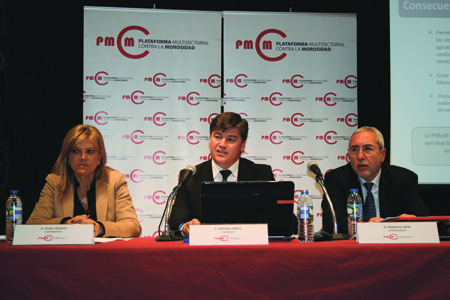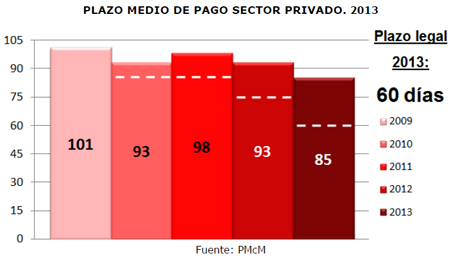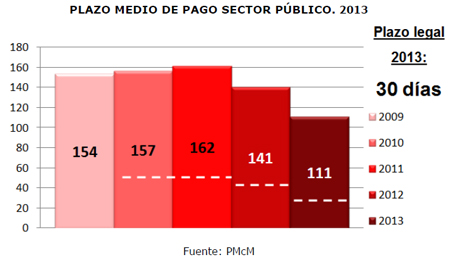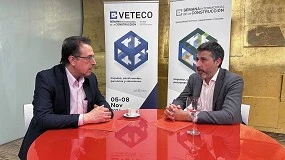Two new rules put in danger this improvement of the morosidad
The terms of payment of the public sector and of the companies diminish 21% and 9%
According to the annual report of the PMcM, 68,1% of the employers had in 2013 agreements or commercial agreements with customers that demanded them terms of upper payment to the 60 days that established the Law. The half term of payment of the private sector happened of 93 days in 2012 to 85 in 2013, in front of the 60 days that marks the law. By his part, the period of payment of the public sector improved in 30 days, reducing of 141 days in 2012 to 111 the past year, figure that, even so, almost cuadruplica the legal maximum (30 days).

Spokesmen of the PMcM.
One of them is the preliminary draft of Law of Promotion of the Business Financials, specifically two of his disposals, that allow, in the cases in which the debt or the credit yield to a third, the pact between the companies surpassing the 60 days established by law. To set up , would put up the price of the costs of the SMEs to earn in term, worsening once again his financial situation.
The another modification that asks the PMcM is the one of the article 216 of the Law of Agreements of the Public sector, with the aim that the Public Administrations respect the term of 30 days to approve the certifications of work as it marks the Law of morosidad, and finish like this with the possibility that they can lengthen the terms of payment by means of agreement between the parts. In opinion of Cañete, “if they do not rectify these norms definitely will worsen the situation of SMEs and autonomous to earn of agreement to the legal terms”.
Report Morosidad: they register improvements, but still far of the legal terms

According to the report of the PMcM, elaborated from near of 1.000 surveys realizar to his organisations associated, the AA.PP. They took in 2013 in paying to his providers almost four times more than what marked the Law (30 days), to an average of 111, an inferior register in 30 days to the that estimated for the previous year, that went of 141 days. By his part, in 2013 the half term of payment in the private sector was of 85 days (in front of the 60 that established the Law), what supposed a decrease of eight days with regard to the estimates effected for 2012 (93 days).

These improvements outline “still insufficient because the figures are far from the terms allowed by the law”, ensures the president of the PMcM, Antoni Cañete, the one who remembers that “it is necessary to finish what before with this type of abuses; the lacra of the morosidad has caused the closing of a third of the 500.000 companies that have disappeared from the start of the crisis”.
Data of the study have desvelado that 68,1% of the companies polled (only 2,7 points porcentuales less than the previous year), had during 2013 agreements or commercial agreements with customers of the private sector that demanded them terms of upper payment to the 60 days that established the Law 15/2010, “a situation of abuse that from the PMcM report the year happened in reiterated occasions”, signals Cañete.
The report also aims that the ratio of morosidad (percentage of non-payments with regard to the total of turnover), enciphered in 5,1%, what meant a reduction of 1,9 points porcentuales with regard to 2012 (7%).
In case to suffer non-payments, only a chamber of the respondents demanded to his delinquent customers the interests of demora, in front of 75% remaining that never or hardly ever did it during 2013. Between the causes that aims Cañete, could have to “especially more to the fear that to the own ignorance”, basing in that 79,5% of the respondents has ensured to know the existence of the Law 3/2004 of 29 December and of the modifications entered by the art. 33 of the Law 11/2013, of 26 July, although well it is true that “does not leave to surprise that 20,5% of the companies still the desconozca”.
In some previous polls to the survey of manufacturing of the annual report, the PMcM ascertained the fact that determinate companies were communicating to his providers that if they received to the VAT of box would not hire them more, for like this opt by those providers with which can deduce the VAT without having paid. Such was like this, that the report of the PMcM has desvelado that of 40% of the companies that fulfilled the requirements to receive to the VAT of box, so alone did it 15% of them.
To finish with this abuse, the PMcM remembers one of his proposals, that consists in that the Government invest the subject passive so that the provider (in his majority SMEs) remain exonerated of the anticipate of the tax and put of self-evident which customers (many are big companies) do not pay his bills to time.
If they analyse the last years observes that the actions realizar in different fields have comported a progressive improvement of the terms of payment. In total, the average descended of 2009 to 2013 27,9% in the public sector, and 15,8% in the private. Between other measures, stand out the set up of the Law of Fight against the Morosidad in the Commercial Operations and of the European Directive, the payment of the historical debt by part of CC.AA. And City councils through the plans of payment of the Government and also the measure that allowed to finish with the deal of favour of the contractors of public work.
In this line, the PMcM poses alternative proposals to reduce of effective form the morosidad, for example, implant measures no coercive of intermediation extrajudicial like the figure of the mediator that so much success harvests in France; that there is a mechanism that ensure that the contractors pay to his subcontracted; create the Observatory against the Morosidad, that contemplates the active and explicit participation of the PMcM, and whose set up would allow to know with rigurosidad the behaviour in the payments in our country; and establish a penalizing diet.
In this sense, the report of the PMcM collects the opinion of the companies on if they believe necessary to implant this system to solve the problem of the morosidad. Almost the whole of the respondents (94%) manifested to be in favour. From the starts of the PMcM, one of his greater claims has been the set up of the penalizing diet, with which pretends normalise the payments between companies with fines from 30.000 until 900.000 euros. In these moments finds in parliamentary formality of the hand of CiU and on request of the PMCM, waiting for that it go out advance with the support of the rest of parliamentary groups, as they advanced during the II Summit of Morosidad organised by the PMcM. The president of the entity has remembered that “it is necessary that fulfil this commitment to put end to the morosidad”.




























































































































